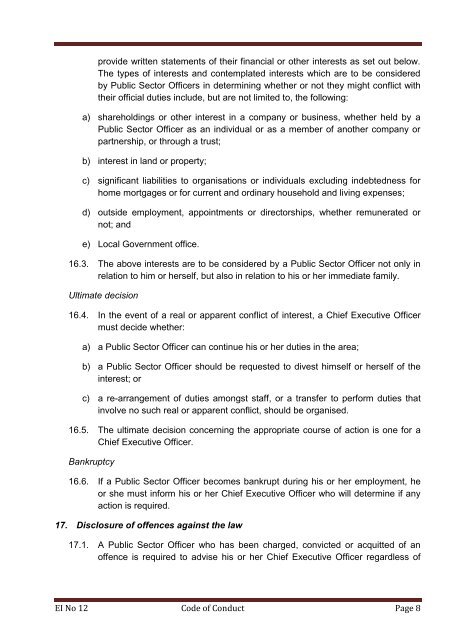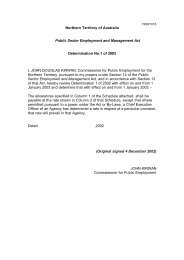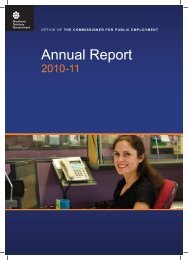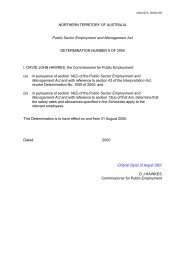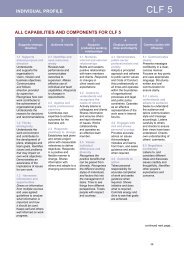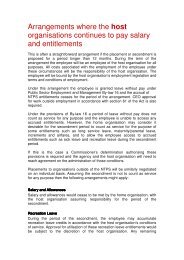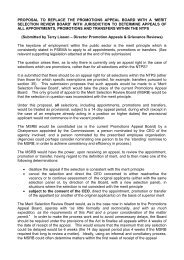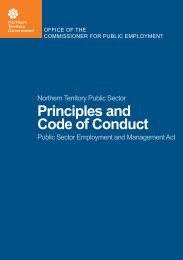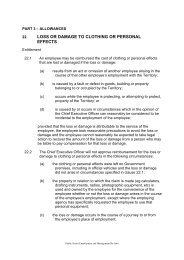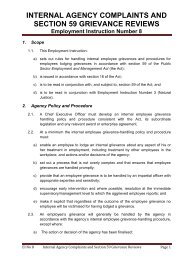Code of Conduct - Office of the Commissioner for Public Employment
Code of Conduct - Office of the Commissioner for Public Employment
Code of Conduct - Office of the Commissioner for Public Employment
You also want an ePaper? Increase the reach of your titles
YUMPU automatically turns print PDFs into web optimized ePapers that Google loves.
provide written statements <strong>of</strong> <strong>the</strong>ir financial or o<strong>the</strong>r interests as set out below.The types <strong>of</strong> interests and contemplated interests which are to be consideredby <strong>Public</strong> Sector <strong>Office</strong>rs in determining whe<strong>the</strong>r or not <strong>the</strong>y might conflict with<strong>the</strong>ir <strong>of</strong>ficial duties include, but are not limited to, <strong>the</strong> following:a) shareholdings or o<strong>the</strong>r interest in a company or business, whe<strong>the</strong>r held by a<strong>Public</strong> Sector <strong>Office</strong>r as an individual or as a member <strong>of</strong> ano<strong>the</strong>r company orpartnership, or through a trust;b) interest in land or property;c) significant liabilities to organisations or individuals excluding indebtedness <strong>for</strong>home mortgages or <strong>for</strong> current and ordinary household and living expenses;d) outside employment, appointments or directorships, whe<strong>the</strong>r remunerated ornot; ande) Local Government <strong>of</strong>fice.16.3. The above interests are to be considered by a <strong>Public</strong> Sector <strong>Office</strong>r not only inrelation to him or herself, but also in relation to his or her immediate family.Ultimate decision16.4. In <strong>the</strong> event <strong>of</strong> a real or apparent conflict <strong>of</strong> interest, a Chief Executive <strong>Office</strong>rmust decide whe<strong>the</strong>r:a) a <strong>Public</strong> Sector <strong>Office</strong>r can continue his or her duties in <strong>the</strong> area;b) a <strong>Public</strong> Sector <strong>Office</strong>r should be requested to divest himself or herself <strong>of</strong> <strong>the</strong>interest; orc) a re-arrangement <strong>of</strong> duties amongst staff, or a transfer to per<strong>for</strong>m duties thatinvolve no such real or apparent conflict, should be organised.16.5. The ultimate decision concerning <strong>the</strong> appropriate course <strong>of</strong> action is one <strong>for</strong> aChief Executive <strong>Office</strong>r.Bankruptcy16.6. If a <strong>Public</strong> Sector <strong>Office</strong>r becomes bankrupt during his or her employment, heor she must in<strong>for</strong>m his or her Chief Executive <strong>Office</strong>r who will determine if anyaction is required.17. Disclosure <strong>of</strong> <strong>of</strong>fences against <strong>the</strong> law17.1. A <strong>Public</strong> Sector <strong>Office</strong>r who has been charged, convicted or acquitted <strong>of</strong> an<strong>of</strong>fence is required to advise his or her Chief Executive <strong>Office</strong>r regardless <strong>of</strong>EI No 12 <strong>Code</strong> <strong>of</strong> <strong>Conduct</strong> Page 8


